Nine Ways to Get Readers For Your Book
A long, long time ago, I wrote a guest post for a magazine about advice for authors who want to reach out to book bloggers, entitled something like “Top Ten Tips for Authors Reaching Out to Book Bloggers” or something. I’ve completely lost the link for that post, and so many times I’ll be on forums and groups for authors and see questions like “How do I get more reviews?” or “How do I find reviewers to read my book?” and I’ll wish to all the bookish gods that I still had the link for that article.

I touched on this subject a little bit in my previous post, How Do Book Reviewers Approach Your Book? In that post, I talked about books that I’ve organically approached: finding a book by chance at the library or bookstore, or being recommended a book by Booktube or a friend. Today I’d like to delve more deeply into authors reaching out to reviewers like me to try and solicit more reviews for their book.
Before I go too deeply into this post, though, I must remind everyone of the main conclusion I found through delving into the statistics of my reading journey: word of mouth sells books. The majority of my books were ones that other people, whether that be an influencer or a friend, told me to read. If you are an author, the number one thing that will get you more readers is someone who loved your book shoving it into their friend’s hands and saying “OH MY GOD YOU NEED TO READ THIS BOOK RIGHT NOW YOU WILL LOVE THE HECK OUT OF IT!!!” And getting a blogger or Youtuber to love your book has even more power; not only will that blogger or Youtuber tell their friends to read the book, they’ll shout about it to the ends of the Earth on their platforms.

Well, that, and the other main conclusion was that if you want me to read your book, you have to write a really good book and then get it into my hands somehow.
In this post, I’ll be answering three major questions: How do I find book reviewers to read my book? How do I get them to read my book? and How should I react once they do read my book?
 Find your target audience
Find your target audienceYou’ve already done this, I assume, because you’re a master of marketing? No, you haven’t? Well, then, allow me to take your hand and lead you through an essential part of marketing a book… COMP TITLES!!
I am such a huge advocate for comp titles. I see you indie authors in the comments like “I thought comp titles were only necessary for traditional publishing!” Nope. You need them. Just trust me, you do.
But Corinne, what is a comp title?
A comp title, or comparison title, is a book that you can say “Fans of (insert book title here) will also like my book!” or “If my book were in a library or bookstore, it’d go on the shelf right next to (insert book title or author here)!”
What makes a good comp title?
There are three aspects that make a good comp title.
Recently published – Ideally your comp title will have been published within the last five years. Three years if you can manage it. The one exception to this, I’ve found, is if it’s a well-known classic (though there is a caveat about using classic books–see #3 on the list)
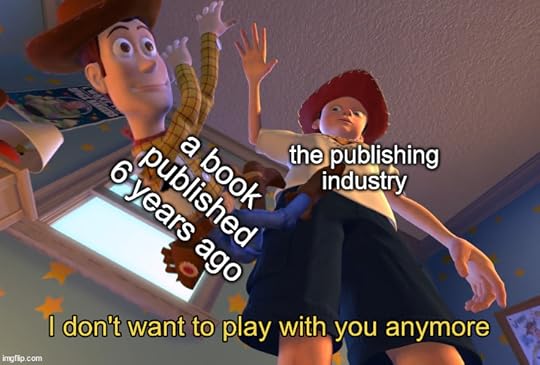
Similar to your book in some way, other than just genre and age category. Sure A Court of Thorns and Roses and Lord of the Rings are both adult fantasies, but ACOTAR is a faerie romance and LOTR is an epic evil-vs-good sword and sorcery story. You need something else that connects your two stories, whether that be theme, concept, voice, characters, etc. “Fans of The Girl Who Fell Beneath the Sea will also like my book because my story is an Asian-based fantasy that explores fate and the power of love triumphing over everything.” “Fans of Sweet and Bitter Magic will like my book because my book is also a sapphic fantasy about learning to accept oneself.”
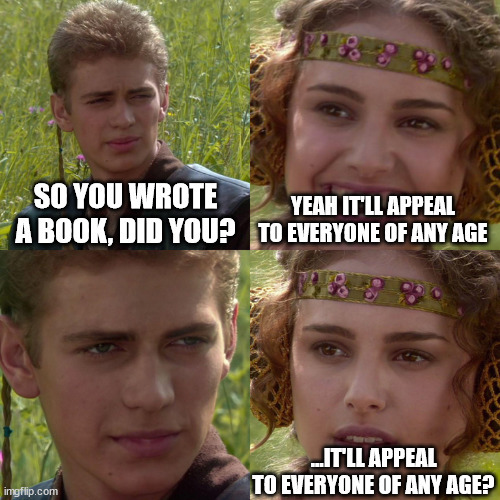
Popular enough that it’s got a solid fanbase but not so popular that it’s surpassed its target audience. For example, it’s impossible to use The Hunger Games as a comp book because everyone and their mother has read it. It’s no longer just appealing to its target audience, it now appeals to everyone. (And I see you novice writers in the comments saying “But my book also appeals to everyone! It doesn’t have a target audience!” No. It does not appeal to “everyone” and if you think otherwise then you need to get your head reexamined. Trust me on this one.) You’ll also want to avoid using classic books for the most part because they also tend to surpass their target audience after a time, though it’s more of a gray area. On the other end of the spectrum, you don’t want to use an indie book that’s only got ten reviews, all of which are the author’s friends and family.
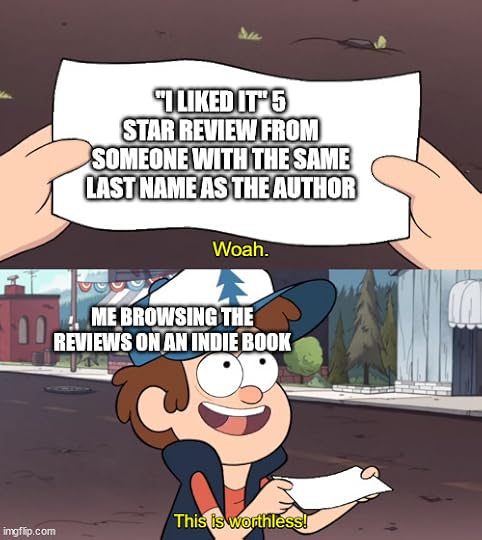
For more advice about how to choose good comp titles, check out this Youtube video from Bookends Literary Agency about the topic:
How to Choose Comp Titles – via Bookends Literary Agency on YoutubeOnce you’ve got your comp titles nailed down, you’re going to hop over to our good friend Google and search “(comp title) review” and start looking at all the blogs and reviews that are within the past six months. Reviews much older than that run the risk of the reviewer’s tastes having changed. Look at some of the other books that reviewer has talked about and make sure you’ve got a good understanding of their reading tastes. Then, once you know that their reading tastes align with your book, you’re going to hop on over to their Contact page or their review policy. MAKE SURE TO READ THE REVIEW POLICY OR CONTACT PAGE VERY CAREFULLY BECAUSE SOMETIMES REVIEWERS GO ON HIATUS OR STOP BLOGGING AND WILL POST A NOTICE ON THEIR POLICY THAT SAYS “I AM NOT ACCEPTING BOOKS FOR REVIEW”. I cannot count how many books I’ve received from authors who are obviously mass-emailing every blogger they can find that failed to read the “I am not currently accepting books for review” sentence on my Contact page.
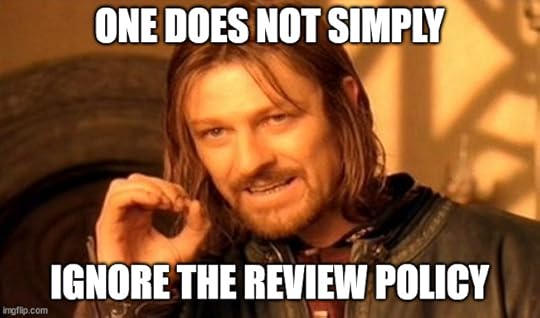
Which leads me right into my next point…
Read the review policy very carefully
Make sure you read the blogger’s review policy very carefully so you understand things like
Is that blog run by an individual person or a group of reviewers? If it’s a group, how do they decide who reads a book that is sent to them by an author?
How does the blogger want to be contacted? Do they have a contact form, or do they want you to send them an email directly? Do they want you to send just the first three chapters so they can get a feel for your writing before committing to a full read? Do they have a preferred format for the book file?
Do they automatically post the review across all review sites like Goodreads and Amazon as well as their blog, or is the review limited to just their blog? If they limit the review to just their blog, do they require a fee of some sort to post the review to other sites? (sometimes this is the only way bloggers can make money from their reviews)
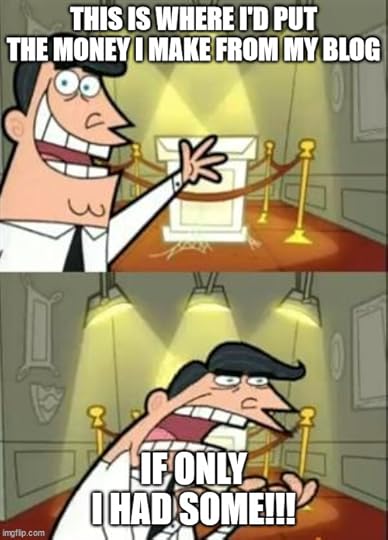
What other expectations does this blogger have for dealing with authors who solicit reviews? Do they have specific books they do and don’t want to read? (eg. a larger reviewer I follow doesn’t want to read books about miscarriage because that’s a huge trigger for her, whereas I will not read any depictions of animal abuse because it is triggering for me)
Also make sure to read some of their other reviews just so you get an understanding of their review style, how often they post, how much they read of your genre, etc. For example, when I review, I give a “three good things three bad things” examination of the book so my blog’s readers can decide for themselves whether or not to pick up a book, and I often like to pepper my review with memes about the book or the plot. Some authors who I’ve reviewed (I won’t name names) have taken this personally because they don’t want me to criticize their book at all and they view it as an attack on their precious book baby. So if you look at some of their reviews and can’t imagine them saying similar things about your own book, you’re probably better off not working with them.
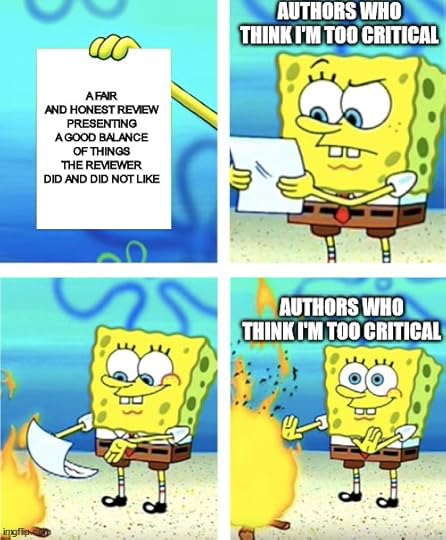
Which, again, leads me to my next point…
Follow all their instructions for how to solicit them for a review, and don’t get offended if they say no
Sometimes even if the book seems like a great match on paper, the blogger will still decide not to read it. Maybe they have a ton of other books they’re trying to get through at the moment and they just don’t have the time to dedicate to another one. Maybe they’re dealing with a personal issue of some sort and don’t have the time or energy to devote to your book.
Sometimes reviewers say no for other reasons: they try the first few chapters but don’t like the writing style, they just couldn’t connect to the characters, or they don’t think they could give the book a good rating. Again, not every book is going to appeal to every reader, and reviewers usually have a good sixth sense about whether or not they’ll like a book.
For example, I was once contacted by an author who wanted a review for a book he’d written about a dog. He specifically referenced my The Travelling Cat Chronicles review and said that his book was like that one so he was sure I’d like it. Well, one thing that really drew me into The Travelling Cat Chronicles was the snarky, deprecating voice of the main narrator, Nana. Meanwhile, the book he’d sent didn’t have the same voice; it was more of a “The dog walked down the street. He sniffed a trash can. He wondered if he’d get something to eat soon.” sort of dry narration. In addition, there was a scene right in the first chapter of the dog, who was a stray, walking down the street and seeing a young woman about my age. Instead of feeling sorry for the dog and maybe trying to give it something to eat or finding a shelter that could take the dog in, the woman kicked the dog and screamed at it.
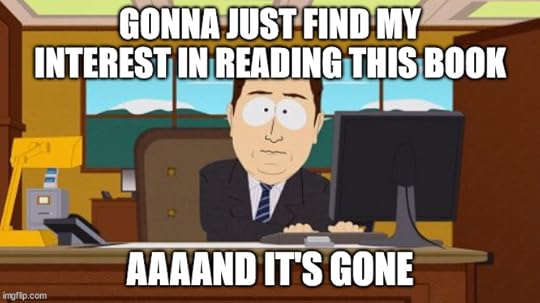
I am a huge animal lover, and depictions of animal abuse can be really triggering for me, so I had to stop reading at that scene. I knew almost immediately I wouldn’t be able to give the book a good rating, so I responded to the author saying “Thanks but no thanks, I don’t think I’d be able to give this book a good rating, and the scene of the woman kicking the dog just doesn’t sit right with me because animal abuse is really triggering for me.” He immediately sent me back a very vitriolic response that said something along the lines of “Well, it’s very realistic and happens every day and it’s your problem if you don’t like it.”
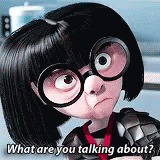
My fourth tip for getting reviewers for your book is personalize your email. While it’s understandable that you can’t spend hours reading through the archives of one blog just to make sure a reviewer will like your book, including even just a little bit of personalization in your email will make the reviewer feel more respected and valued, and will give you a good first impression. Things like:
-Getting the reviewer’s name, blog title, and pronouns correct
-Mentioning a recent post of theirs (“Your review of Shadow and Bone that you posted in June mentioned that you really enjoy stories with Russian influence, and my book is also Russian-inspired”)
-Mentioning something from their review policy (“As indicated in your review policy, I’ve attached the first three chapters of my book in MS Word format for your perusal”)
can really do wonders for making a good first impression with a reviewer. It makes us think you’re not just mass-emailing every blog you can find, but that you’re taking the time to actually read our review policy and understand our tastes and you’ve done your research and know that your book will be a good fit for us. Just like you wouldn’t mass-email resumes on a job search or mass-email queries to literary agents, you should try to avoid mass-emailing bloggers when soliciting reviews. It’s just basic respect. And I see some of you in the comments “But Corinne, that’s just common sense!” this advice is not for you. It’s for the 1-2% of authors who don’t understand that bloggers are people, too, and deserving the same respect you’d show to a literary agent or a hiring manager.
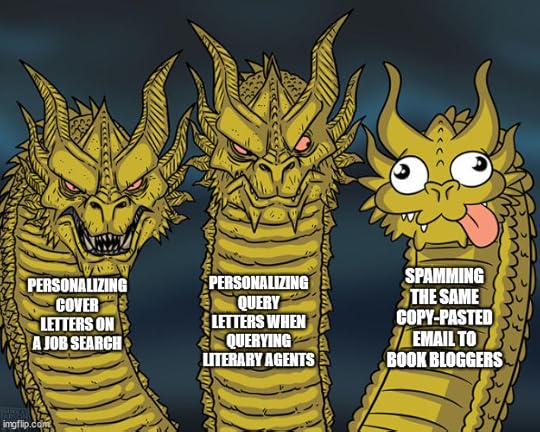
Also make sure to say thank you, regardless of whether or not they actually read your book! If they say no, tell them thank you for the consideration. If they say yes, tell them thank you for the opportunity. If they say yes and then end up giving the book two stars, say thank you for reading my book.
Tip #5 is assume not every email results in a review.
I don’t want to crush anyone’s dreams here, but I also want to make sure authors go into this with realistic expectations. So let’s say I’m an author who just published a book and am looking for reviewers to help promote it. I send the book out to five reviewers, making sure to follow their review policies and all the other tips I’ve introduced so far on this page.
Blogger #1: never responds because they’ve gotten burnt out from blogging lately and have been considering quitting or taking a break but just haven’t remembered to put on their site that they ‘re not accepting books for review.
Blogger #2: is rather intrigued by the premise and how I’ve compared my book to Words Bubble Up Like Soda Pop, which is their favorite movie, but then they read the first three chapters and decide they just can’t connect to the main character, so they decide not to finish it.
Blogger #3: is very intrigued by the premise and how I’ve compared my book to Love & Gelato, which they reviewed last month and gave five stars, so they give it a try. They read the whole thing, but ultimately are not as satisfied with the ending as they thought they would be, and they’ve seen one too many authors like Piper CJ and Kathleen Hale retaliating against reviewers who give their books less than stellar reviews, so they decide not to post the review.
Blogger #4: is very interested in reading it and reads it all the way through, and ends up loving it. They give the book 5 stars but they’re so busy with their other reviews and their day job and family that they promise themselves “I’ll write this review later” and then never get around to it.
Blogger #5: is very interested in reading it and reads it all the way through, and ends up loving it. They give the book 5 stars, taking detailed and thorough notes while they read, and the review goes up a few weeks later, talking about how much they loved how the antagonist spoke mostly in metaphors and the main couple was so sweet together.
My point being, assume that out of five emails you send, that will only net you one review. If your email-to-review ratio ends up being higher than that, great! But I just don’t want authors to get their hopes up that every single email will result in that coveted review. We bloggers try our best to review the books we’ve read and loved, and we do our best to try and support authors (because let’s face it, we wouldn’t be where we are if not for authors writing books!) but sometimes it just doesn’t happen.
Because of this, if you’re an author who wants more reviews for your book, you should use this 1:5 rule when planning out how many people to contact. If you want five reviews, better email 25 bloggers. If you want 10 reviews, you’ll need at least 50 bloggers. Of course, if you’re emailing that many people, there’s a higher chance that more than 1/5 of them will end up reviewing your book, because real life doesn’t follow a perfect ratio like that. But then that’s a good thing! If you email 50 bloggers expecting ten reviews and you end up with twenty of them who read and review your book, even better! There are very few instances where more reviews is a bad thing. The one example I can think of is in the case of something like The Hunger Games, where it gets so many people reading it that it starts surpassing its target audience and getting more negative reviews.
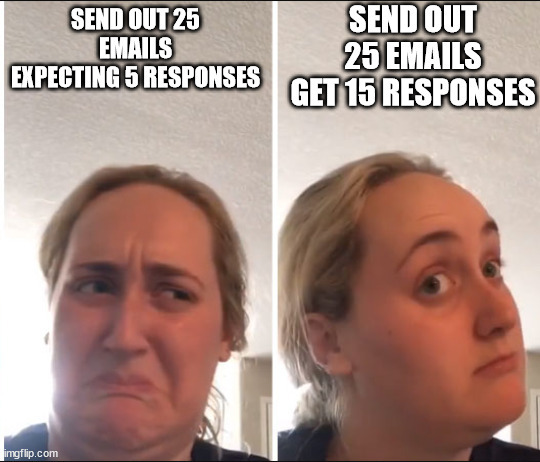
Tip #6: Do not get offended if the reviewer doesn’t like the book.
Even if the reviewer gave it one star and ranted for three paragraphs about how your protagonist is such a Mary Sue and the love interest is such a cardboard cutout and there’s no chemistry, their opinion is still valid. You might be tempted to get defensive and jump in the comments or in their email and lecture them about how they didn’t get the book and how they completely missed the point. Do. Not. Do. This. Remember that once you hit “Publish” on your book, it is no longer yours; it belongs to the world. It’s one thing to email a reviewer and ask them if they’d like to read your book, but another to jump on a reviewer for a less-than-favorable review. Sarah Stusek, Richard Brittain, Kathleen Hale, Piper CJ… the list goes on and on of authors who have gone after reviewers who gave their books less-than-favorable reviews. It’s become such a problem that reviewers are even afraid to post reviews, no matter how glowing and favorable, because the author still might take offense. I’ve definitely had my fair share of authors attacking me for things I’ve said in my reviews.

So what to do if you send your book to a reviewer and they end up not liking it and giving it a lower rating than you expected and you’re upset? First off, it’s okay to be upset. You spent all that time and energy on writing your book and then more time and energy researching bloggers and making sure you only contacted ones you were sure would love your book, and yet one of them didn’t like your book.
If something like this happens to you, take a deep breath, step away from your computer, and go hydrate. If you’re still upset by it, then call up a friend or hop in your author group chat or private (note the private) Discord or whatever other way you connect with other authors. Again, privately. Rant all you like privately about how disappointed you are that the blogger didn’t like your book. No matter how upset you are, though, never take it to a public forum, and never do it in a group chat/FB group/Discord where the blogger in question, or even other bloggers, have access to it. Keep your ranting to fellow authors or family members or friends who aren’t part of the bookish community. Bloggers talk, and we have really great whisper networks. If an author comes after a reviewer for a negative review, everyone else in the blogging sphere will hear about it. Even something that seems as innocent as an author complaining about a negative review that resulted from them soliciting a blogger can give a bad impression to reviewers; it tells them that you’re the sort of author who isn’t afraid to cross boundaries and get revenge on reviewers who don’t love your book. (If you doubt the power of bloggers’ whisper networks, go look up Kathleen Hale, Richard Brittain, or Piper CJ and see how the blogging/reviewing community view them now. )
This is not to scare you. 99% of authors are perfectly acceptable and wonderful people. But the 1% of authors who cross the line and attack us for our opinions give a bad rep to all authors.
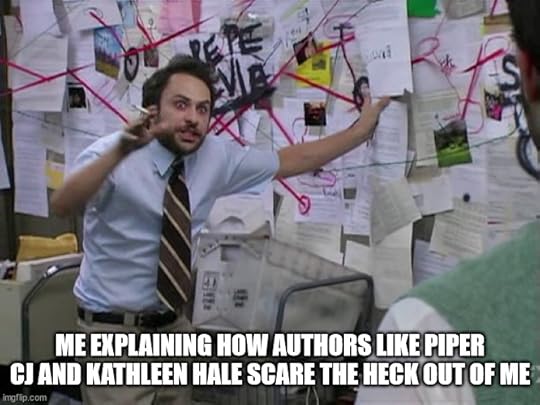
If you did not personally solicit the review and you just happen to be glancing at your book’s Goodreads page (eg. to check the effectiveness of a particular marketing strategy and to see if it netted you more readers overall) and see a negative review, DO NOT ENGAGE, I REPEAT, DO NOT ENGAGE. Log off, call a friend, and take a walk. It’s not the end of the world.
Tip #7 is they’re doing you a favor, so do them a favor and give them the book for free.
Did you know that some authors will reach out to reviewers and say “Here’s the press kit for my book, I would love it if you would give it a review,” then when the reviewer is like “Yes, your book sounds wonderful! Please send me a copy!” the author, instead of giving them a free ePUB copy, says “Great! Here’s the link on Amazon, it’s $12.99 for the paperback or $5.99 for the Kindle version!”
Don’t do this. Just trust me on this. Shipping paperbacks to reviewers is expensive and a lot of us understand that. But sending a reviewer a free ePUB file of your book costs you basically nothing. If the reviewer decides independently to pick up your book and read it, the responsibility is on them to obtain a copy, which is usually buying a physical or ebook copy with their own money or borrowing it from the library or a friend.
My theory about why authors do this is they get excited about the possibility of one imminent sale and don’t realize what the etiquette is for “who is responsible for getting a copy of the book into the reviewer’s hands?” Just remember “whoever extends the invitation pays for the date.” So if you are the one to extend the invitation to a reviewer to read your book, you are the one responsible for getting the reviewer a copy of said book.

Tip #8: Get yourself a good editor.
If you published traditionally, your publisher would have already hired an editor for you, and you can skip right down to tip #9. But if you self-publish, you need to make sure to hire a good editor to give your book a once-over. Maybe it had dozens of beta readers and critique partners who caught all the plot holes and logical inconsistencies and you just need a proofreader. Maybe you haven’t sought out any feedback on your book yet and are doing some research before uploading it to Amazon. Either way, get yourself a good editor. Yes, that means you reading this. Educate yourself on the different kinds of editors and figure out which one you need, then go get yourself one.
A developmental editor will work with you exclusively on big-story issues, such as plot, character development, and theme. They’re like a professional beta reader, but way way better.
A line editor will review your prose and make suggestions about how to reword/rewrite sentences and passages to sound better. Eg. they might look at a sentence like “The very light blue sky sparkled in the bright summer sunshine as Mark leapt lightly down the hill toward his middle school” and suggest that you rewrite it to something like “The summer sky sparkled with sunshine as Mark danced down the hill toward his school.”
A proofreader will look exclusively at grammar and spelling issues. They’ll catch all those pesky Oxford commas, the places where you used a hyphen instead of an em dash, and the inevitable misspelling of the word vacuum in Chapter Seventeen.
Sometimes a developmental editor can also do proofreading services, or a proofreader can offer line editing services. Look at the packages they offer, as well as speak to current and former clients, and choose the editor who would work best with you.
Of course, editing should always happen before you hit “publish” on your book. Sometimes, especially if the book hasn’t gotten many readers and hasn’t been out for too long, you can justify pulling it to make revisions, especially if the revisions that need to be made are major story revisions. The reason I mention editors is because typos and unclear prose can prevent a reader from getting invested in the story, resulting in the inevitable DNF/low rating, and plot holes/unsatisfying character arcs or story endings can ruin the book for a reviewer. If you want reviewers, and readers, to finish your book until the final page and love it to bits, make sure your book is edited to be the best it possibly can be.
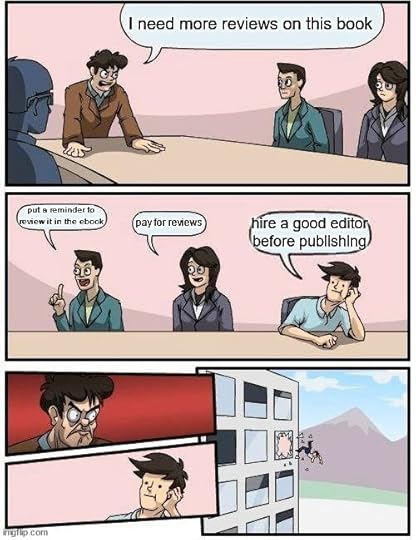
(Also pro tip: if you’re considering getting both a developmental edit and a proofreader, do the developmental edit first because you will probably end up having to rewrite stuff anyway, so you’ll want to wait on the proofread until you do the developmental edit and won’t need to rewrite stuff anymore)
Tip #9: Remember who the review is for.
Repeat after me: Reviews are for other readers, not for the author of the book.
Reviews are not for you, the author. Reviews are for other readers who are considering whether or not to read/buy the book. Meaning that there is one very important temptation that you must resist: do not read reviews of your book on Amazon or Goodreads. The one exception is if you have done some sort of extra marketing campaign and you want to check if it’s had any effect. Even so, if you are the sort of person who would get upset seeing someone say something negative about your book, maybe don’t look at the reviews yourself and instead have a trusted friend do it for you.
“But Corinne, I need to read my reviews so I can get feedback on my book and know how to improve my writing in the future!”

This is not the purpose of reviews. Feedback on your book should come before your book is published, from beta readers, critique partners, and your editor. I know you can technically “unpublish” the book, edit it, and put it back up again, but it doesn’t give off a good impression, in my opinion. As a reader, if I were to pick up a book and not enjoy how it ended, then go to the reviews to see if other people felt the same way, only to see that the book had originally had a different ending and the author had pulled it and rewritten the whole thing after the first initial reviews had gone up, I wouldn’t feel good. It just looks unprofessional. The one exception to this is maybe if you happen to notice a review that says “This book had quite a few typos in it” and you go back and reread your manuscript again and notice the typos; if that were to happen, it is understandable that you might pull the book, fix the typos, and re-upload it. (As a reviewer, if I were to review a book and say something like “This book had a lot of typos and it needed a good editor” and then later the author were to reach out to me to say “Hey I fixed all the typos can you go ahead and delete that line from your review?” I would get pretty weirded out; that seems like a boundary that shouldn’t be crossed to ask a reviewer to change what they said about a book, even if you, the author, go in and fix what they said wasn’t good about the book. If I were the author and this happened to me, I would simply seek out new reviews to essentially “drown out” the outdated one that mentioned the typos.)
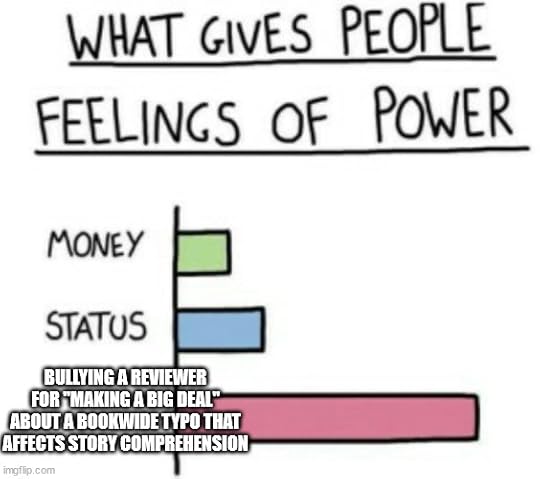
(Yes, this did happen to me one time–I reviewed a book where there was a certain character who vanished halfway through the story, and then all of a sudden was replaced with a different character whose name was spelled very similarly. This confused me at the time and I thought they were two separate characters, so I mentioned it in my review. The publishers read my review and came after me saying that it was “unprofessional” for me to mention a typo in my review and refused to listen to reason when I tried to explain that I legitimately thought they were intended to be two different characters. Because it’s not as if it’s the publisher’s fault for not noticing the character’s name had been misspelled for fourteen whole chapters before sending me the book. )
)
In conclusion
When you are an author contacting a reviewer: Remember the human behind the computer
Remember the human behind the computer Do your research into what bloggers would like your book
Do your research into what bloggers would like your book When a negative review comes in, stay calm and move on
When a negative review comes in, stay calm and move on
If you liked this post and want to support my content, please consider following me on any of the following platforms, or hitting that blue “subscribe” button to your right!
Twitter | Youtube | Bookstagram | Goodreads | Tiktok
If you enjoyed this post, you might also like these other posts from me:
How Do Book Reviewers Approach Your Book?
Corinne 乙女



